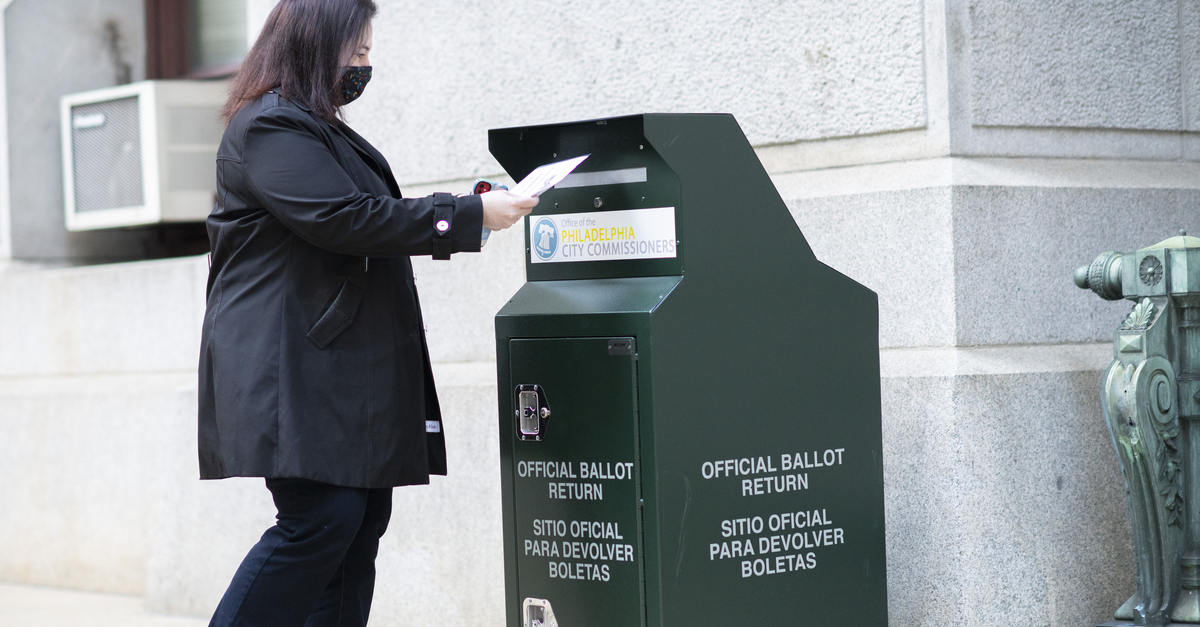
A voter casts a ballot at an early voting drop box outside of City Hall on October 17, 2020 in Philadelphia, Pennsylvania.
The top court in the Commonwealth of Pennsylvania has ruled that a 2019 mail-in voting law that passed with strong Republican support is constitutional, after a challenge brought by a group of GOP lawmakers who initially supported the law.
A product of bi-partisan compromise, the legislation at issue, Act 77, was passed with much acclaim from both parties, as the details were hammered out by Democratic Gov. Tom Wolf and the Republican-dominated Pennsylvania General Assembly.
“Act 77 was an enormously popular piece of legislation on both sides of the aisle,” the court remarked in an introductory section of Tuesday’s ruling. “In the state Senate, Act 77 passed 35-14, with Republicans voting 27-0 in favor along with eight Democrats.”
Along with the provision creating universal, excuse-free absentee voting, the compromise bill also extended deadlines for returning ballots, created a permanent mail voter list, reduced the deadline for voter registration from 30 days to 15 days before an election, eliminated straight-ticket voting, and provided $90 million to upgrade voting machines.
Then came the coronavirus pandemic, which necessitated the widespread use of mail-in voting during the 2020 election, and former president Donald Trump‘s opposition to the concept – along with a barrage of conspiracy theories about it. Suddenly, as the new law was being implemented, many of the same Republicans who voted for the new voting system adamantly claimed opposition.
In a series of consolidated cases stylized as McLinko v. Degraffenreid, Bradford County Board of Commissioners Chair Doug McLinko and 11 GOP legislators who voted for Act 77 argued that the creation of “a qualified mail-in elector” class was a violation of the commonwealth’s constitution, citing language that a voter must reside for at least 60 days in the district where they “offer to vote” prior to an election.
To hear the Republican opponents of mail-in voting tell it, that phrase is a term of art which means a person must physically vote in-person.
In a 5-2 ruling along party lines, however, the Pennsylvania Supreme Court overturned longstanding precedent that held that “offer to vote” means a person must be physically present and hand in their ballot. Five Democrats voted to dispense with the prior interpretation, while two Republicans would have retained the voting limitation.
“[O]ur General Assembly is endowed with great legislative power, subject only to express restrictions in the Constitution,” the majority opinion by Justice Christine Donohue reads. “We find no restriction in our Constitution on the General Assembly’s ability to create universal mail-in voting.”
The Republican plaintiffs, who won a short-lived victory against mail-in voting in a lower court, argued that two decades- and century-plus-old cases mandated in-person voting. In response, Pennsylvania’s secretary of state argued that neither of those cases mandated any such thing, but if they did, the high court should overturn those rulings.
The majority declined to overrule the cases, instead ruling in a more limited fashion. Those prior rulings, the majority said, were simply based on outdated versions of Pennsylvania’s constitution.
“We therefore conclude that neither Chase nor Lancaster City support the conclusion that ‘offer to vote’ creates in-person ballot-casting as a voter qualification in Article VII, Section 1 of the Pennsylvania Constitution in effect when Act 77 was enacted,” the opinion says. “Rather, the phrase ‘offer to vote’ is a descriptive term, used to define the election district residency requirement found in Article VII, Section 1(3).”
The court goes on to further explain its legal analysis:
The phrase “where he or she shall offer to vote” is a descriptive clause that modifies the object of the prepositional phrase “in the election district.” It does no more than identify the district in which the elector is eligible to vote, which is the interpretation supported by the recorded history. Given the clear intent of Section 1 to set forth the qualification to vote, this is the most natural reading…
The legislature has wide-ranging power to set up the state’s methods of voting, the court ruled, and the extent of that power is key to the majority’s analysis.
The ruling also cites a news article that noted that Pennsylvania Republicans strongly supported mail-in voting before Trump “politicized” it after his 2020 loss to President Joe Biden.
The foremost restriction — in fact the only restriction — that the legislature has when it comes to setting up voting standards, the majority held, is to maintain “the secrecy of an elector’s vote.”
The upshot of the ruling is that voters in Pennsylvania will now be able to vote by mail without having to provide any excuse – as voters in more than half of all U.S. states are currently allowed to do.
“Today’s court ruling definitively asserts that mail-in voting is a legal and constitutional method for Pennsylvania voters,” Wolf said in a statement. “By upholding the law, which the General Assembly approved in 2019 in a bipartisan manner, this ruling assures that mail-in voting remains in place and Pennsylvanians will be able to cast their ballot legally in person or by mail without any disruption or confusion.”
[image via Mark Makela/Getty Images]
Have a tip we should know? [email protected]